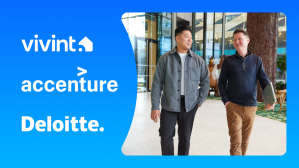It’s the phone tree-to-human agent Rube Goldberg machine. Someone calls the helpline or front desk, asks a question, gets put on hold, gets transferred to another department, gets asked the same questions again. Ten minutes later, they may know when the yoga class is or have managed to rebook their flight, but that 10 minutes feels wasted. Using AI and Agentforce, however, companies can turn this tedium into a smooth, seamless experience. It’s a use case that’s not about getting people to buy more products. It’s about making them happier with whatever they already have.
Engine
Engine is a travel platform where businesses and groups can reserve hotels, flights, and car rentals. Sometimes, though, those groups have to cancel those arrangements. Now Eva, Engine’s Agentforce-powered assistant, can take that on. If someone wants to cancel three rooms from a 15-room reservation, Eva can combine data from the customer’s profile and interaction history, connect to the company’s internal booking platform, and cancel the unwanted rooms, without human reps needing to spend valuable time on an administrative task.
“They can get that resolution in seconds and just go back to doing what they want to do,” said Joshua Stern, Director of GTM Systems at Engine. “Who wants to sit there on a phone call being like, ‘I want to cancel my booking, I want to change the dates’?”
One key to success was narrowing down the scope of topics Eva could address to about six. That move improved latency and speed to resolution, and customer satisfaction scores improved by six points. That shift is “absolutely incredible,” said Sarah Morton, Engine’s Senior Salesforce Administrator. Less frustration, less hold time, more travel.
Williams Sonoma, Inc.
The Williams Sonoma Olive agent can help customers process returns. It can serve them up menus and wine pairings. But it can also pick up some of that mental load inherent to entertaining: What does the host need to do, and when, so they’re ready when guests arrive? Site visitors can ask Olive for menu ideas then for a prep schedule that walks them through when to make the cranberry sauce (T minus 48 hours) and when to put the biscuits (T minus 30 minutes). It’s not about selling people more stuff. “It’s about helping teach our customers culinary skills; it’s about menus and recipes,” said Sameer Hassan, the company’s Chief Technology and Digital Officer “It’s about helping them entertain at home. … It’s helping to deliver experiences that resonate.”
Equinox
The search is not a hideous chore, but it does involve a fair number of clicks around a website: Which nearby clubs offer early morning yoga classes? Do they still have spots? Where does the class sign-up page live? Now the Equinox Agentforce-powered agent can handle that journey, all the way up to booking a class for the club member, in one chat window. “It saves about three or four clicks,” says Eswar Veluri, Equinox EVP and CTO. “It’s about looking at existing patterns of usage that can be made easier by using agents. That’s how we are leaning into our member experience.”
Go deeper:
- Lessons from real-world Agentforce rollouts
- Report: Technical leaders need data overhaul for AI strategies to succeed
- How businesses use AI to meet people where (and when) they are



















